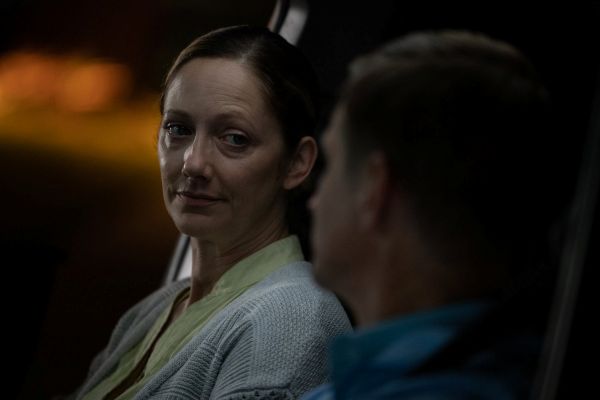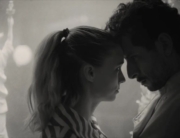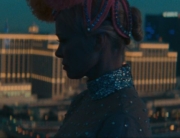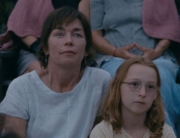
You sense it in the dark, empty hallway in the film’s opening image; you hear it in the discordant music, and you see it in the defeated expression of Janice LaRue (Judy Greer): Something traumatic has happened off-screen, and its aftereffects are far from gone. Janice’s son, Eric (Nation Sage Henderson), procured guns without his parents’ knowledge, walked into school, and murdered three of his classmates. Neither of his parents has yet visited him in the prison where he’s being held.
How do you handle a tragedy like this? Janice is trying to figure that out for herself. She returns to work (at a big-box retail store like Walmart) but is harassed by a customer who recognizes her and mockingly asks for help choosing a gun. Her husband, Ron (Alexander Skarsgård), has fallen under the sway of an evangelical pastor (a simultaneously warm and menacing Tracy Letts), alongside Lisa (Alison Pill), the HR representative at his job—there seems to be romantic tension between them as well.
The pastor encourages Ron to believe that his struggles are mere illusions separating him from the love of Jesus. Janice, unconvinced, sees the aftereffects of trauma as challenges that must be faced head-on. As a result, she and Ron argue and drift apart. Pastor Calhan (Paul Sparks), a gentler and more grounded representative of the faith, persuades Janice to attend a meeting with the mothers of the murdered teens—this is the next step she’s most open to. Ideally, the group will be able to make peace and move toward some kind of collective healing. But there’s no guarantee that all parties will be willing to have that conversation—or that Janice will be as safe from spite as Pastor Calhan promises.
Eric LaRue is actor Michael Shannon’s directorial debut, based on a play of the same name by Brett Neveu. The two have a long history in the Chicago theater scene, particularly at A Red Orchid Theatre. I saw a different play by Neveu years ago at the now-defunct House Theatre of Chicago and have always appreciated Chicago theater as the gritty underdog to New York’s glitz and glamour.
All of this is to say: I was rooting for this film to succeed more than it actually does. It’s a creaky piece, weighed down by many of the typical stage-to-screen growing pains. Scenes feel stagy—not because they’re limited to a single location, but because they revolve awkwardly around dialogue rather than image. Some shots are strangely angled, unmistakably the work of a first-time filmmaker, and more than a few characters feel a bit flat, functioning more as embodiments of viewpoints than fully realized people. (It’s generous to assume something was lost in translation, since the play was well reviewed.)
Still, the film doesn’t collapse, and considerable beauty manages to break through as the story unfolds. There are some excellent performances—especially from Greer, whose emotional depth and sensitivity to the other actors make you want to see much more of her work. She never lets sorrow drown out tenderness, and a late scene between her and Eric is one of the most powerful here. There are also intriguing moments where the film touches on expressionism—like a lovely scene in which Janice steps into her son’s abandoned bedroom, only for it to transform briefly into the room as it was when he was much younger.
What truly sets this drama apart is its refusal to offer easy answers. This isn’t just because the writer and director wisely avoid any illusion that the characters’ troubles will disappear overnight. No two characters truly manage to see eye to eye; no feasible solution is ever presented for the problems at hand. No one, except perhaps Janice, is willing to look at the situation in its entirety—all the factors that may have contributed to the tragedy, all the conflicting emotions the mothers inevitably carry. Pastor Calhan, who appears as the voice of reason, becomes singularly useless when the meeting of the mothers actually comes about, partially because of his own naivety. (He essentially says that no one is allowed to be mad. Good luck with that.)
And when no one is strong enough to step back and fully face the complexity of the tragedy, there’s nowhere to go. That is the film’s great insight—and what makes it vastly superior to others with similar subject matter, like Mass, and allows the viewer to forgive many of its flaws.
Shannon’s debut, stumbling into the world rather than arriving fully formed, still manages to leave its mark.
















Leave A Comment